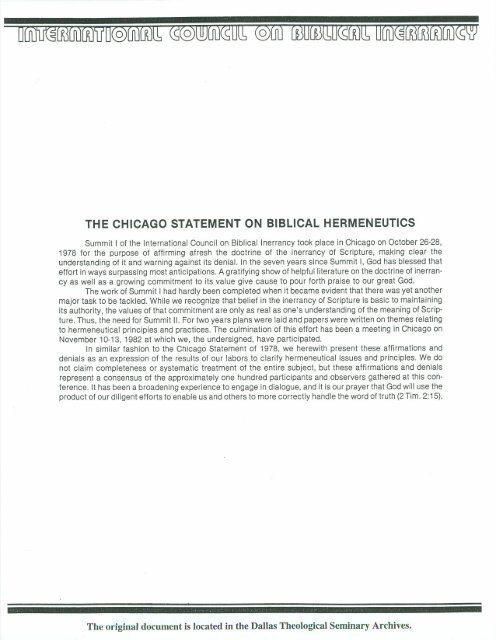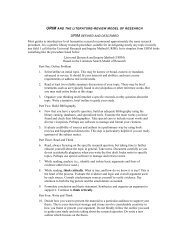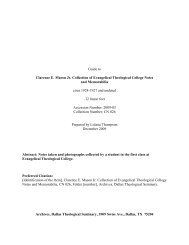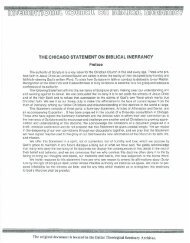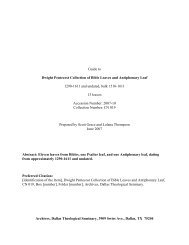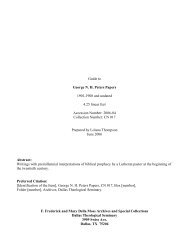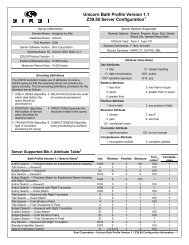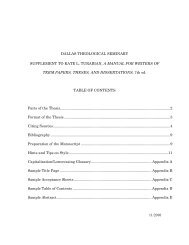Chicago Statement on Biblical Hermeneutics - Dallas Theological ...
Chicago Statement on Biblical Hermeneutics - Dallas Theological ...
Chicago Statement on Biblical Hermeneutics - Dallas Theological ...
Create successful ePaper yourself
Turn your PDF publications into a flip-book with our unique Google optimized e-Paper software.
THE CHICAGO STATEMENT ON BIBLICAL HERMENEUTICSSummit I of the Internati<strong>on</strong>al Council <strong>on</strong> <strong>Biblical</strong> Inerrancy took place in <str<strong>on</strong>g>Chicago</str<strong>on</strong>g> <strong>on</strong> October 26-28,1978 for the purpose of affirming afresh the doctrine of the inerrancy of Scripture, making clear theunderstanding of it and warning against its denial. In the seven years since Summit I, God has blessed thateffort in ways surpassing most anticipati<strong>on</strong>s. A gratifying show of helpful literature <strong>on</strong> the doctrine of inerrancyas well as a growing commitment to its value give cause to pour forth praise to our great God.The work of Summit I had hardly been completed when it became evident that there was yet anothermajor task to be tackled. While we recognize that belief in the inerrancy of Scripture is basic to maintainingits authority, the values of that commitment are <strong>on</strong>ly as real as <strong>on</strong>e's understanding of the meaning of Scripture.Thus, the need for Summit II. For two years plans were laid and papers were written <strong>on</strong> themes relatingto hermeneutical principles and practices. The culminati<strong>on</strong> of this effort has been a meeting in <str<strong>on</strong>g>Chicago</str<strong>on</strong>g> <strong>on</strong>November 10-13, 1982 at which we, the undersigned, have participated.In similar fashi<strong>on</strong> to the <str<strong>on</strong>g>Chicago</str<strong>on</strong>g> <str<strong>on</strong>g>Statement</str<strong>on</strong>g> of 1978, we herewith present these affirmati<strong>on</strong>s anddenials as an expressi<strong>on</strong> of the results of our labors to clarify hermeneutical issues and principles. We d<strong>on</strong>ot claim completeness or systematic treatment of the entire subject, but these affirmati<strong>on</strong>s and denialsrepresent a c<strong>on</strong>sensus of the approximately <strong>on</strong>e hundred participants and observers gathered at this c<strong>on</strong>ference.It has been a broadening experience to engage in dialogue, and it is our prayer that God will use theproduct of our diligent efforts to enable us and others to more correctly handlethe word of truth (2Tim. 2:15).The original document is located in the <strong>Dallas</strong> <strong>Theological</strong> Seminary Archives.
I-ARTICLESOF AFFIRMATI"ONAND DENIALArticle IWe affirm that the normative authority of Holy Scripture is the authority of God Himself, and is attested byJesus Christ, the Lord of the Church.We deny the legitimacy of separating the authority of Christ from the authority of Scripture, or of opposingthe <strong>on</strong>e to the other.Article IIWe affirm that as Christ is God and Man in <strong>on</strong>e Pers<strong>on</strong>, so Scripture is, indivisibly, God's Word in humanlanguage.We deny that the humble, human form of Scripture entails errancy any more than the humanity of Christ,even in His humiliati<strong>on</strong>, entails sin.Article IIIWe affirm that the Pers<strong>on</strong> and wo"rkof Jesus Christ are the central focus of the entire Bible.We deny that any method of interpretati<strong>on</strong> which rejects or obscures the Christ-centeredness of Scripture iscorrect.Article IVWe affirm that the Holy Spirit who inspired Scripture acts through it today to work faith in its message.We deny that the Holy Spirit ever teaches to any<strong>on</strong>e anything which is c<strong>on</strong>trary to the teaching of Scripture.Article VWe affirm that the Holy Spirit enables believers to appropriate and apply Scripture to their lives.We deny that the natural man is able to discern spiritually the biblical message apart from the Holy Spirit.Article VIWe affirm that the Bible expresses God's truth in propositi<strong>on</strong>al statements, and we declare that biblicaltruth is both objective and absolute. We further affirm that a statement is true if it represents matters as theyactually are, but is an error if it misrepresents the facts.We deny that, while Scripture is able to make us wise unto salvati<strong>on</strong>, biblical truth should be defined interms of this functi<strong>on</strong>. We further deny that error should be defined as that which willfully deceives.Article VIIWe affirm that the meaning expressed in each biblical text is single, definite and fixed.We deny that the recogniti<strong>on</strong> of this single meaning eliminates the variety of its applicati<strong>on</strong>.ArticleWe affirm that the Bible c<strong>on</strong>tains teachings and mandates which apply to all cultural and situati<strong>on</strong>al c<strong>on</strong>.texts and other mandates which the Bible itself shows apply <strong>on</strong>ly to particular situati<strong>on</strong>s.We deny that the distincti<strong>on</strong> between the universal and particular mandates of Scripture can be determinedby cultural and situati<strong>on</strong>al factors. We further deny that universal mandates may ever be treated as culturallyor situati<strong>on</strong>ally relative.VIIIArticle IXWe affirm that the term hermeneutics, which historically signified the rules of exegesis, may properly be extendedtoGoverall that is involvedinthe processof perceivingwhatthebiblicalrevelati<strong>on</strong>meansand how itbears <strong>on</strong> our lives.The original document is located in the <strong>Dallas</strong> <strong>Theological</strong> Seminary Archives.
We deny that the message of Scripture derives from, or is dictated by, the interpreter's understanding. Thuswe deny that the "horiz<strong>on</strong>s" of the biblical writer and the interpreter may rightly "fuse" in such a way thatwhat the text communicates to the interpreter is not ultimately c<strong>on</strong>trolled by the expressed meaning of theScripture.Article XWe affirm that Scripture communicates God's truth to us verbally through a wide variety of literary forms.We deny that any of the limits of human language render Scripture inadequate to c<strong>on</strong>vey God's message.Article XIWe affirm that translati<strong>on</strong>s of the text of Scripture can communicate knowledge of God across all temporaland cultural boundaries.We deny that the meaning of biblical texts is so tied to the culture out of which they came that understandingof the same meaning in other cultures is impossible.Article XIIWe affirm that in the task of translating the Bible and teaching it in the c<strong>on</strong>text of each culture, <strong>on</strong>ly thosefuncti<strong>on</strong>al equivalents which are faithful to the c<strong>on</strong>tent of biblical teaching should be employed.We deny the legitimacy of methods which either are insensitive to the demands of cross-cultural communicati<strong>on</strong>or 'distort biblical meaning in the process.ArticleXIIIWe affirm that awareness of the literary categories, formal and stylistic, of the various parts of Scripture isessential for proper exegesis, and hence we value genre criticism as <strong>on</strong>e of the many disciplines of biblicalstudy.We deny that generic categories which negate historicity may rightly be imposed <strong>on</strong> biblical narrativeswhich present themselves as factual.ArticleXIVWe affirm that the biblical record of events, discourses and sayings, though presented in a variety of appropriateliterary forms, corresp<strong>on</strong>ds to historical fact.We deny that any event, discourse or saying reported in Scripture was invented by the biblical writers or bythe traditi<strong>on</strong>s they incorporated.Article XVWe affirm the necessity of interpreting the Bible according to its literal, or normal, sense. The literal sense isthe grammatical-historical sense, that is, the meaning which the writer expressed. Interpretati<strong>on</strong> accordingto the literal sense will take account of all figures of speech and literary forms found in the text.We deny the legitimacy of any approach to Scripture that attributes to it meaning which the literal sensedoes not support.Article XVIWe affirm that legitimate critical techniques should be used in determining the can<strong>on</strong>ical text and its meaning.We deny the legitimacy of allowing any method of biblical criticism to questi<strong>on</strong> the truth or integrity of thewriter's expressed meaning, or of any other scriptural teaching.Article XVIIWe affirm the unity, harm<strong>on</strong>y and c<strong>on</strong>sistency of Scripture and declare that it is its own best interpreter.The original document is located in the <strong>Dallas</strong> <strong>Theological</strong> Seminary Archives.
We deny that Scripture may be interpreted in such a way as to suggest that <strong>on</strong>e passage corrects ormilitates against another. We deny that later writers of Scripture misinterpreted earlier passages of Scripturewhen quoting from or referring to them.ArticleXVIIIWe affirm that the Bible's own interpretati<strong>on</strong> of itself is always correct, never deviating from, but ratherelucidating, the single meaning of the inspired text. The single meaning of a prophet's words includes, but isnot restricted to, the understanding of those words by the prophet and necessarily involves the intenti<strong>on</strong> ofGod evidenced in the fulfillment of those words.We deny that the writers of Scripture always understood the full implicati<strong>on</strong>s of their own words.Article XIXWe a'ffirm that any preunderstandings which the interpreter brings to Scripture should be in harm<strong>on</strong>y withscriptural teaching and subject to correcti<strong>on</strong> by it.We deny that Scripture should be required to fit alien preunderstandings, inc<strong>on</strong>sistent with itself; such asnaturalism,evoluti<strong>on</strong>ism,scientism,secular humanism,and relativism. .Article XXWe affirm that since God is the author of all truth, all truths, biblical and extrabiblical, are c<strong>on</strong>sistent andcohere, and that the Bible speaks truth when it touches <strong>on</strong> matters pertaining to nature, history, or anythingelse. We further affirm that in some cases extrabiblical data have value for clarifying what Scriptureteaches,andfor promptingcorrecti<strong>on</strong>of faulty interpretati<strong>on</strong>s. .We deny that extrabiblical views ever disprove the teaching of Scripture or hold priority over it.Article XXIWe affirm the harm<strong>on</strong>y of special with general revelati<strong>on</strong> and therefore of biblical teaching with the facts ofnature.We deny that any genuine scientific facts are inc<strong>on</strong>sistent with the true meaning of any passage of Scripture.Article XXIIWe affirm that Genesis 1-11 is factual, as is the rest of the book.We deny that the teachings of Genesis 1-11 are mythical and that scientific hypotheses about earth historyor the origin of humanity may be invoked to overthrow what Scripture teaches about creati<strong>on</strong>.Article XXIIIWe affirm the clarity of Scripture and specifically of its message about salvati<strong>on</strong> from sin.We deny that all passages of Scripture are equally clear or have equal bearing <strong>on</strong> the message of redempti<strong>on</strong>.We affirmscholars.Article XXIVthat a pers<strong>on</strong> is not dependent for understanding of Scripture <strong>on</strong> the expertise of biblicalWe deny that a pers<strong>on</strong> should ignore the fruits of the technical study of Scripture by biblical scholars.ArticleWe affirm that the <strong>on</strong>ly type of preaching which sufficiently c<strong>on</strong>veys the divine revelati<strong>on</strong> and its proper applicati<strong>on</strong>to life is that which faithfully expounds the text of Scripture as the Word of God.We deny that the preacherhasany messagefrom God apart from the text of Scripture.- .. III! . -XXVThe original document is located in the <strong>Dallas</strong> <strong>Theological</strong> Seminary Archives.
1J(n)1f~W(n)Wl(DC0(n)W(1 ~C0~@(JUw~(n)(3WWW(n)~lVTHE CHICAGO STATEMENTON BIBLICAL HERMENEUTICSExpositi<strong>on</strong>The following paragraphs outline the generaltheological understandingwhich the <str<strong>on</strong>g>Chicago</str<strong>on</strong>g> <str<strong>on</strong>g>Statement</str<strong>on</strong>g><strong>on</strong> <strong>Biblical</strong> <strong>Hermeneutics</strong> reflects. They were firstdrafted as a stimulus toward that statement. They havenow been revised in the light of it and of many specificsuggesti<strong>on</strong>s received during the scholars' c<strong>on</strong>ference atwhich it was drawn up. Though the revisi<strong>on</strong> could not becompleted in time to present to the c<strong>on</strong>ference, there isevery reas<strong>on</strong> to regard its substance as expressingwithbroad accuracy the comm<strong>on</strong> mind of the signatories ofthe statement.Standpoint of the Expositi<strong>on</strong>The living God, Creator and Redeemer, is acommunicator, and the inspired and inerrant Scriptureswhich set before us his saving revelati<strong>on</strong> in history arehis meansof communicating with us today. Hewho <strong>on</strong>cespoke to the world through Jesus Christ his S<strong>on</strong> speaksto us still in and through his written Word. Publicly andprivately, therefore, through preaching, pers<strong>on</strong>al studyand meditati<strong>on</strong>, with prayer and in the fellowship of thebody of Christ, Christian people must c<strong>on</strong>tinually labor tointerpret the Scriptures so that their normative divinemessage to us may be properly understood. To haveformulated the biblical c<strong>on</strong>cept of Scripture asauthoritative revelati<strong>on</strong> in writing, the God-given rule offaith and life, will be of no profit where the message ofScripture is not rightly grasped and applied. So it is ofvital importance to detect and dismiss defective ways ofinterpreting what is written and to replace them withfaithful interpretati<strong>on</strong> of God's infallible Word.That is the purpose this expositi<strong>on</strong> seeks to serve.What it offers is basic perspectives <strong>on</strong> the hermeneuticaltask in the light of three c<strong>on</strong>victi<strong>on</strong>s. First, Scripture,being God's own instructi<strong>on</strong> to us, is abidingly true andutterly trustworthy. Sec<strong>on</strong>d, hermeneutics is crucialto the battle for biblical authority in the c<strong>on</strong>temporarychurch. Third, as knowledge of the inerrancy of Scripturemust c<strong>on</strong>trol interpretati<strong>on</strong>, forbidding us to discountanything that Scripture proves to affirm, so interpretati<strong>on</strong>must clarify the scope and significance of that inerrancyby determining what affirmati<strong>on</strong>s Scripture actuallymakes.The Communi<strong>on</strong> between God and MankindGod has made mankind in his own image, pers<strong>on</strong>aland rati<strong>on</strong>al, for eternal loving fellowship with himself in. a communi<strong>on</strong>that rests <strong>on</strong> two-waycommunicati<strong>on</strong>:God addressing to us words of revelati<strong>on</strong> and weanswering him in words of prayer and praise. God's giftof language was given us partly to make possible theseinterchanges and partly also that we might share ourunderstanding of God with others.In testifying to the historical process from Adam toChrist whereby God re-established fellowship with ourfallen raGe,SGripturedepiGt8him a8 GOn8tantlyu8inghi8own gift of language to send men messages about whathe would do and what they should do. The God of theBible uses many forms of speech: he narrates, informs,instructs, warns, reas<strong>on</strong>s, promises, commands,explains, exclaims, entreats and encourages. The Godwho saves is also the God who speaks in all these ways.<strong>Biblical</strong> writers, historians, prophets, poets andteachers alike, cite Scripture as God's word of addressto all its readers and hearers. To regard Scripture as theCreator's present pers<strong>on</strong>al invitati<strong>on</strong> to fellowship,setting standards for faith and godliness not <strong>on</strong>ly for itsown time but for all time, is integral to biblical faith.Though God is revealed in the natural order, in thecourse of history and in the deliverances of c<strong>on</strong>science,sin makes mankind impervious and unresp<strong>on</strong>siveto thisgeneral revelati<strong>on</strong>. And general revelati<strong>on</strong> is in any case<strong>on</strong>ly a disclosure of the Creator as the world's good Lordand just Judge; it does not tell of salvati<strong>on</strong> throughJesusChrist. To know about the Christ of Scripture is thus anecessity for that knowledge of God and communi<strong>on</strong>with him to which he calls sinners today. As the biblicalmessage is hear9, read, preached and taught, the HolySpirit works with and through it to open the eyes of thespiritually blind and to instill this knowledge.God has caused Scripture so to be written, and theSpirit so ministers with it, that all who read it, humblyseeking God's help, will be able to understand its savingmessage. The Spirit's ministry does not make needlessthe discipline of pers<strong>on</strong>al study but rather makes. iteffective.To deny the rati<strong>on</strong>al, verbal, cognitive character ofGod's communicati<strong>on</strong> to us, to posit an ,antithesis assome do between revelati<strong>on</strong> as pers<strong>on</strong>al and aspropositi<strong>on</strong>al, and to doubt the adequacy of languageaswe have it to bring us God's authentic message arefundamental mistakes. The humble verbal form ofbiblical language no more invalidates it as revelati<strong>on</strong> ofGod's mind than the humble servant-form of the Wordmade flesh invalidates the claim that Jesus truly revealsthe Father.To deny that God has made plain in Scripture asmuch as each human being needs to know for his or herspiritual welfare would be a further mistake. Anyobscurities we find in Scripture are not intrinsic to it butreflect our own limitati<strong>on</strong>s of informati<strong>on</strong> and insight.Scripture is clear and sufficient both as a source ofdoctrine, binding the c<strong>on</strong>science, and as a guide toeternal life and godliness, shaping our worship andservice of the God who creates, loves and saves.The Authority of ScriptureHoly Scripture is the self-revelati<strong>on</strong> of God in andthrough the words of men. It is both their witness to Godand God's witness to himself. As the divine-humanrecord and interpretati<strong>on</strong> of God's redemptive work inhi8tory, it i8 Gognitive revelati<strong>on</strong>, truth addres8edto ourIIThe original document is located in the <strong>Dallas</strong> <strong>Theological</strong> Seminary Archives.
l1li ~-~--~o_, ,_.,, WfiUiBl!III Ii ~"'--minds for understanding and resp<strong>on</strong>se. God is itssource, and Jesus Christ, the Savior, is its center ofreference and main subject matter. Its absolute andabiding worth as an infallible directive for faith and livingfollows from its God-givenness (cf. 2 Tim. 3:15-17). Beingas fully divine as it is human, it expresses God's wisdomin all its teaching and speaks. reliably - that is, infalliblyand inerrantly - in every informative asserti<strong>on</strong> it makes.It is a set of occasi<strong>on</strong>al writings, each with its ownspecific character and c<strong>on</strong>tent, which togetherc<strong>on</strong>stitute an organism of universally relevant truth,namely, bad news about universal human sin and needanswered by good news about a particular first-centuryJew who is shown to be the S<strong>on</strong> of God and the world's<strong>on</strong>ly Savior. The volume which these c<strong>on</strong>stituent booksmake is as broad as life and bears up<strong>on</strong> every humanproblem and aspect of behavior. In setting before us thehistory of redempti<strong>on</strong>-the law and the gospel, God'scommands, promises, threats, works and ways; andobject-less<strong>on</strong>s c<strong>on</strong>cerning faith and obedience and theiropposites, with their respective outcomes-Scriptureshows us the entire panorama of human existence asGod wills us to see it.The authority of Holy Scripture is bound up with theauthority of Jesus Christ, whose recorded words expressthe principle that the teaching of Israel's Scriptures (ourOld Testament), together with his own teaching and thewitness of the apostles (our New Testament), c<strong>on</strong>stitutehis appointed rule of faith and c<strong>on</strong>duct for his followers.He did not criticize his Bible, though he criticizedmisinterpretati<strong>on</strong>s of it; <strong>on</strong> the c<strong>on</strong>trary, he affirmed itsbinding authority over him and all his disciples (cf. Matt.5:17-19). To separate the authority of Christ from that ofScripture and to oppose the <strong>on</strong>e to the other are thusmistakes. To oppose the authority of <strong>on</strong>e apostle to thatof another or the teaching of an apostle at <strong>on</strong>e time tothat of his teaching at another time are mistakes also.The Holy Spirit and the ScripturesThe Holy Spirit of God, who moved the humanauthors to produce the biblical books, now accompanies'them with his power. He led the church to discern theirinspirati<strong>on</strong> in the can<strong>on</strong>izing process; he c<strong>on</strong>tinuallyc<strong>on</strong>firms this discernment to individuals through theunique impact which he causes Scripture to make up<strong>on</strong>them. He helps them as they study, pray, meditate andseek to learn in the church, to understand and committhemselves to those things which the Bible teaches, andto know the living triune God whom the Bible presents.The Spirit's illuminati<strong>on</strong> can <strong>on</strong>ly be expectedwhere the biblical text is diligently studied. Illuminati<strong>on</strong>does not yield new truth, over and above what the Biblesays; rather, it enables us to see what Scripture wasshowing us all al<strong>on</strong>g. Illuminati<strong>on</strong> binds our c<strong>on</strong>sciencesto Scripture as God's Word and brings joy and worshipas we find the Word yielding up to us its meaning. Byc<strong>on</strong>trast, intellectual and emoti<strong>on</strong>al impulses todisregard or quarrel with the teaching of Scripture comenot from the Spirit of God but from some other source.Dem<strong>on</strong>strable misunderstandings and misinterpretati<strong>on</strong>sof Scripture may not be ascribed to the Spirit's leading.The Idea of <strong>Hermeneutics</strong><strong>Biblical</strong> hermeneutics has traditi<strong>on</strong>ally beenunderstood as the study of right principles forunderstanding the biblical text. "Understanding" maystop short at a theoretical and noti<strong>on</strong>al level, or it mayadvance via the assent and commitment of faith tobecome experiential through pers<strong>on</strong>al acquaintancewith the God to whom the theories and noti<strong>on</strong>s refer.Theoretical understanding of Scripture requires of us nomore than is called for to comprehend any ancientliterature, that is, sufficient knowledge of the languageand background and sufficient empathy with thedifferent cultural c<strong>on</strong>text. But there is no experientialunderstanding of Scripture - no pers<strong>on</strong>al knowledge ofthe God to whom it points - without the Spirit'silluminati<strong>on</strong>. <strong>Biblical</strong> hermeneutics studies the way inwhich both levels of understanding are attained.' .The Scope of <strong>Biblical</strong> Interpretati<strong>on</strong>The interpreter's task in broadest definiti<strong>on</strong> is tounderstand both what Scripture meant historically andwhat it means for us today, that is, how it bears <strong>on</strong> ourlives. This task involves three c<strong>on</strong>stant activities.First comes exegesis, this extracting from the textof what God by the human writer was expressing to thelatter's envisaged readers.Sec<strong>on</strong>d comes integrati<strong>on</strong>, the correlating of whateach exegetical venture has yielded with whatever otherbiblical teaching bears <strong>on</strong> the matter in hand and withthe rest of biblical teaching as such. Only within thisframe of reference can the full meaning of the exegeted. teaching be determined.Third comes applicati<strong>on</strong> of the exegeted teaching,viewed explicitly as God's teaching, for the correctingand directing of thought and acti<strong>on</strong>. Applicati<strong>on</strong> isbased <strong>on</strong> the knowledge that God's character and will,man's nature and need, the saving ministry of JesusChrist, the experiential aspects of godliness includingthe comm<strong>on</strong> life of the church and the many-sidedrelati<strong>on</strong>ship between God and his world including hisplan for its history are realities which do not change withthe passing years. It is with these matters that bothtestaments c<strong>on</strong>stantly deal.Interpretati<strong>on</strong> and applicati<strong>on</strong> of Scripture takeplace most naturally in preaching, and all preachingshould be based <strong>on</strong> this threefold procedure. Otherwise,biblical teaching will be misunderstood and misapplied,and c<strong>on</strong>fusi<strong>on</strong> and ignorance regarding God and hisways will result.The original document is located in the <strong>Dallas</strong> <strong>Theological</strong> Seminary Archives.
Formal Rules of <strong>Biblical</strong> Interpretati<strong>on</strong>The faithful use of reas<strong>on</strong> in biblical interpretati<strong>on</strong> isministerial, not magisterial; the believing interpreter willuse his mind not to impose or manufacture meaning butto grasp the meaning that is already there in the materialitself. The work of scholars who, though not themselvesChristians, have been able to understand biblical ideasaccurately will be a valuable resource in the theoreticalpart of the interpreter's task.a. Interpretati<strong>on</strong> should adhere to the literalsense, that is, the single literary meaning whicheach passage carries. The initial quest is always forwhat God's penman meant by what he wrote. Thediscipline of interpretati<strong>on</strong> excludes all attempts togo behind the text, just as it excludes all reading intopassages of meanings which cannot be read out ofthem and all pursuit of ideas sparked off in us by thetext which do not arise as part of the author's own -expressed flow of thought. Symbols and figures ofspeech must be recognized for what they are, andarbitrary allegorizing (as distinct from the drawingout of typology which was dem<strong>on</strong>strably in thewriter's mind) must be avoided.b. The literal sense of each passage shouldbe sought by the grammatical-historical method,that is, by asking what is the linguistically naturalway to understand the text in its historical setting.Textual; historical, literary and theological study,aided by linguistic skills - philological, semantic,logical - is the way forward here. Passages shouldbe exegeted in the c<strong>on</strong>text of the book of which theyare part, and the quest for the writer's own meaning,as distinct from that of his known or supposedsources, must be c<strong>on</strong>stantly pursued. The legitimateuse of the various critical disciplines is not to callinto questi<strong>on</strong> the integrity or truth of the writer'smeaning but simply to help us determine it. .c. Interpretati<strong>on</strong> should adhere to theprinciple of harm<strong>on</strong>y in the biblical material.Scripture exhibits a wide diversity of c<strong>on</strong>cepts andviewpoints within a comm<strong>on</strong> faith and an advancingdisclosure of divine truth within the biblical period.These differences should not be minimized, but theunity which underlies the diversity should not be lostsight of at any point. We should look to Scripture tointerpret Scripture and deny as a matter of methodthat particular texts, all of which have the <strong>on</strong>e HolySpirit as their source, can be genuinely discrepantwith each other. Even when we cannot at presentdem<strong>on</strong>strate their harm<strong>on</strong>y in a c<strong>on</strong>vincing way, weshould proceed <strong>on</strong> the basis that they are in factharm<strong>on</strong>ious and that fuller knowledge will show this.d. Interpretati<strong>on</strong> should be can<strong>on</strong>ical, that is,the teaching of the Bible as a whole should alwaysbe viewed as providing the framework within whichour understanding of each particular passage mustfinally be reached and into which it must finally befitted.Valuable as an aid in determining the literalmeaning of biblical passages is the discipline of genrecriticism, which seeks to identify in terms of style, formand c<strong>on</strong>tent, the various literary categories to which thebiblical books and particular. passages within. thembel<strong>on</strong>g. The literary genre in which each writer createshis text bel<strong>on</strong>gs in part at least to his own culture and willbe clarified through knowledge of that culture. Sincemistakes about genre lead to large-scalemisunderstandings of biblical material, it is importantthat this particular discipline not be neglected.The Centrality of Jesus Christ in the <strong>Biblical</strong> MessageJesus Christ and the saving grace of God in him arethe central themes of the Bible. Both Old and NewTestaments bear witness to Christ, and the NewTestament interpretati<strong>on</strong> of the Old Testament points tohim c<strong>on</strong>sistently. Types and prophecies in the .oldTestament anticipated his coming, his at<strong>on</strong>ing death, hisresurrecti<strong>on</strong>, his reign and his return. The office andministry of priests, prophets and kings, the divinelyinstituted ritual and sacrificial offerings, and the patternsof redemptive acti<strong>on</strong> in Old Testament history, all hadtypical significance as foreshadowings of Jesus. OldTestament believers looked forward to his coming andlived and were saved by faith which had Christ and hiskingdom in view, just as Christians today are saved byfaith in Christ, the Savior, who died for our sins and wh<strong>on</strong>ow lives and reigns and will <strong>on</strong>e day return. That thechurch and kingdom of Jesus Christ are central to theplan of God which Scripture reveals is not open toquesti<strong>on</strong>, though opini<strong>on</strong>s divide as to the precise way inwhich church and kingdom relate to each other. Any wayof interpreting Scripture which misses its c<strong>on</strong>sistentChrist-centeredness must be judged err<strong>on</strong>eous.<strong>Biblical</strong> and Extra-biblical KnowledgeSince all facts cohere, the truth about them must becoherent also; and since God, the author of all Scripture,is also the Lord of all facts, there can in principle be noc<strong>on</strong>tradicti<strong>on</strong> between a right understanding of whatScripture says and a right account of any reality or eventin the created order. Any appearance of c<strong>on</strong>tradicti<strong>on</strong>here. would argue misunderstanding or inadequateknowledge, either of what Scripture really affirms or ofwhat the extra-biblical facts really are. Thus it would be asumm<strong>on</strong>s to reassessment and further scholarlyinquiry.<strong>Biblical</strong> <str<strong>on</strong>g>Statement</str<strong>on</strong>g>s and Natural ScienceWhat the Bible says about the facts of nature is astrue and trustworthy as anything else it says. However, itspeaks of natural phenomena as they are spoken of inordinary language, not in the explanatory technicalterms of modern science; it accounts for natural eventsin terms of the acti<strong>on</strong> of God, not in terms of causal links .within the created order; and it oflen describes natural.. - ........--The original document is located in the <strong>Dallas</strong> <strong>Theological</strong> Seminary Archives...,
processes figuratively and poetically, not analyticallyand prosaically as modern science seeks to do. Thisbeing so, differences of opini<strong>on</strong> as to the correctscientific account to give of natural facts and eventswhich Scripture celebrates can hardly be avoided.It should be.remembered, however, that Scripturewas given to reveal God,not to address scientific issuesin scientific terms, and that, as it does not use thelanguage of modern science, so it does not requirescientific knowledge about the internal processes ofGod's creati<strong>on</strong> for the understanding of its essentialmessage about God and ourselves. Scripture interpretsscientific knowledge by relating it to the revealedpurpose and work of God, thus establishing an ultimatec<strong>on</strong>text for the study and reform of scientific ideas. It isnot for scientific theories to dictate what Scripture mayand'may not say, although extra-biblical informati<strong>on</strong> willsometimes helpfully expose a misinterpretati<strong>on</strong> ofScripture.In fact, interrogating biblical statements c<strong>on</strong>cerningnature in the light of scientific knowledge about theirsubject matter may help toward attaining a more preciseexegesis of. them. For though exegesis must bec<strong>on</strong>trolled by the text itself, not shaped by extraneousc<strong>on</strong>siderati<strong>on</strong>s, the exegetical process is c<strong>on</strong>stantlystimulated by questi<strong>on</strong>ing the text as to whether it meansthis or that.Norm and Culture in the <strong>Biblical</strong> Revelati<strong>on</strong>As we find 'in Scripture unchanging truths aboutGod and his will expressed in a variety of verbal forms,so we find them applied in a variety of cultural andsituati<strong>on</strong>al c<strong>on</strong>texts. Not all biblical teaching aboutc<strong>on</strong>duct is normative for behavior today. Someapplicati<strong>on</strong>s of moral principles are restricted to alimited audience, the nature and extent of whichScripture itself specifies. One task of exegesis is todistinguish these absolute and normative truths fromthose aspects of their recorded applicati<strong>on</strong> which arerelative to changing sitl,Jati<strong>on</strong>s.Onlywhen this distincti<strong>on</strong>is drawn can we hope to see how the same absolutetruths apply to us in our own culture.To fail to see how a particular applicati<strong>on</strong> of anabsolute principle has been culturally determined (forinstance, as most would agree, Paul's command thatChristians greet each other with a kiss) and to treat arevealed absolute as culturally relative (for instance, asagain most would agree, God's prohibiti<strong>on</strong> in thePentateuch of homosexual activity) would both bemistakes. Though cultural developments, includingc<strong>on</strong>venti<strong>on</strong>al values and latter-day social change, maylegitimately challenge traditi<strong>on</strong>al ways of applyingbiblical principles, they may not be used either to modifythose principles in themselves or to evade theirapplicati<strong>on</strong>altogether. .In cross-cultural communicati<strong>on</strong> a further stepmust be taken, the Christian teacher must re-applyrevealed absolutes to pers<strong>on</strong>s living in a culture that isnot the teacher's own.The demandsof this task highlightthe importance of his being clear <strong>on</strong> what is absolute inthe biblical presentati<strong>on</strong> of the will and work of God andwhat is a culturally-relative applicati<strong>on</strong> of it. Engaginginthe task may help him toward clarity at this point bymaking him more alert than before to the presence inScripture of culturally-c<strong>on</strong>diti<strong>on</strong>ed applicati<strong>on</strong>s of truth,which have to be adjusted according to the culturalvariable.Encountering God Through His WordThe twentieth century has seen many attempts toassert the instrumentality of Scripture in bringing to usGod's Word while yet denying that that Word has beenset forth for all time in the words of the piblical text.These views regard the text as the fallible humanwitness by means of which God fashi<strong>on</strong>s and promptsthose insights which he gives us through preaching andBible study. But for the most part these views include adenial that the Word of God is cognitive communicati<strong>on</strong>,and thus they lapse inescapably into impressi<strong>on</strong>isticmysticism. Also, their denial that Scripture is theobjectively given Word of God makes the relati<strong>on</strong> of thatWord to the text indefinable and hence permanentlyproblematical. This is true of all current forms of neeorthodoxand existentialist theology, including the s9-called "new hermeneutic," which is an extreme andincoherent versi<strong>on</strong> of the approach described.The need to appreciate the cultural differencesbetween our world and that of the biblical writers and tobe ready to find that God through his Word is challengmg .the presuppositi<strong>on</strong>s and limitati<strong>on</strong>s of our presentoutlook, are two emphasescurrently associated with the"new hermeneutic." But both really bel<strong>on</strong>g to theunderstanding of the interpretative task which thisexpositi<strong>on</strong> has set out.The same is true of the emphasis laid in theology ofthe existentialist type <strong>on</strong> the reality of transformingencounter with God and his S<strong>on</strong>, Jesus Christ, throughthe Scriptures. Certainly, the crowning glory of theScriptures is that they do in fact mediate life-givingfellowship with God incarnate, the living Christ of whomthey testify, the divine Savior whose words "are spiritand. . . are life" (John6:63). But there is no Christ savethe Christ of the Bible, and <strong>on</strong>ly to the extent that theBible's presentati<strong>on</strong> of Jesus and of God's plancentering up<strong>on</strong> him is trusted can genuine spiritualencounter with Jesus Christ ever be expected to takeplace. It is by means of disciplined interpretati<strong>on</strong> of a. trusted Bible that the Father and S<strong>on</strong>, through the Spirit,make themselves known to sinful men. To suchtransforming encounters the hermeneutical principlesand procedures stated here both mark and guard theroad. .J. I. Packer- I IThe original document is located in the <strong>Dallas</strong> <strong>Theological</strong> Seminary Archives.


